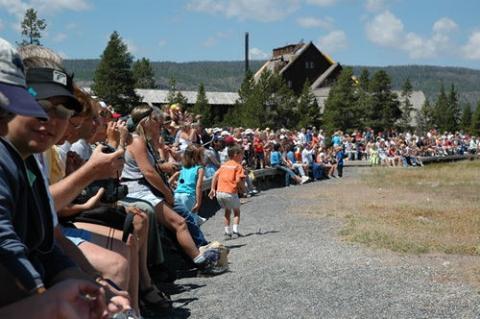Editor's note: Visit Yellowstone, Yosemite, or the Grand Canyon, just to name three parks, during the summer high season and you most decidedly won't be alone. Indeed, if you didn't start planning your trip months earlier, you probably won't find a vacant room in the parks. Is this is a problem that the National Park Service needs to address? Is it time to institute a "white market" for park access? Professor Bob Janiskee takes a look at such a proposal.
It’s conceivable that the National Park Service might eventually have to take drastic measures to reduce peak-season crowding in our most popular national parks. Overcrowding and overuse lead to congested roads and trails, excessive air pollution, accelerated erosion, and many other problems that reduce recreational pleasure and damage park resources. Anyone who visits Grand Canyon, Yosemite, or Yellowstone during the peak season knows that crowding can make a park visit stressful and inconvenient.
The Park Service is already using a variety of strategies and tactics to discourage overcrowding and overuse. But urging people to choose less popular parks and less busy times of year doesn’t do much good, and might actually create new crowding problems. At root, nearly all of the methods that actually work are forms of rationing. For many years now the Park Service and concessionaires have been using first-come, first-served (queuing and reservation) systems, lotteries, and price increases to regulate access to parks, campsites, backcountry trails, whitewater rivers, and other park facilities and activities.
There have even been some attempts to ration by merit or competency, as in screening for the issuing of climbing and mountaineering permits. But what if all of these measures are not enough? What if problems related to overcrowding and overuse in certain heavily used parks become overwhelming?
In the worst case scenario, the Park Service might have to adopt truly draconian measures. Some observers believe that it is only a matter of time before we see strict entrance and recreational facility quotas employed. A few have suggested that access to national parks and their recreational facilities might best be regulated by a national lottery, and that a “white market” for park permits should be allowed to flourish.
Here is how it would work. The Park Service would use the best available scientific methods to determine the recreational carrying capacity, acceptable limits of change, and other limiting factors in parks that experience serious overcrowding and related facilities overuse during peak seasons. The key question is how much access and use can be permitted without seriously reducing recreational quality or causing unacceptable damage to physical and cultural resources in the parks.
The agency would then set peak-period quotas for admission and recreational facilities use at the “problem parks.” Each quota would express the maximum number of permits to be issued for visiting a particular park and engaging in specified recreational activities during a specified period of time. The quotas would be partially filled through allocations to tour operators, park concessionaires, various other commercial recreation providers, and presumably some national NGOs. The remaining permits would be allocated to the public via lottery.
The holder of a peak period permit (“winner,” if you prefer) gains the right to pay all applicable fees and enter a particular park on a specified date, spend a specified amount of time there, and use specified facilities or services inside the park.
The “white market” part of the scheme comes into play after peak period permits are distributed by lottery. There would be no such thing as illegal trade (a black market) in national park permits. Instead, permit holders would have the legal right to do whatever they want with them. If you are lucky enough to receive a peak-period permit through the lottery, but you don’t want to use it, you can give it to your best friend, trade it for one you like better, donate it for charity auction, advertise it for sale on eBay, or whatever. In theory, such a system would protect park resources and recreational quality while giving everyone a reasonable opportunity to gain entry to the most popular national parks during peak periods.
There are plenty of drawbacks to this system, of course, and I suspect that few people would prefer it to what we have now.


 Support Essential Coverage of Essential Places
Support Essential Coverage of Essential Places







Comments
Any question as to what the position of the Sierra Club and the likes would be? Perfect group for satire! Could they take the heat,LOL?
That's not he "American Way" that is the Government not doing it's job in monitoring and regulating the reservation system. The black market exists right now and the Gov, cannot or will not stop it.